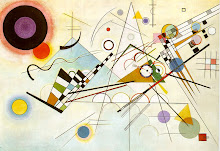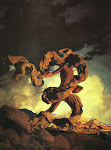The Burning of the Houses of Parliament
1834-1835
I had once heard a story that John Constable, a contemporary of Turner's and a Romantic painter, upon visiting a Turner exhibition for the first time, swore he would quit painting from then on, as he could never reach the heights that Turner travelled on. Looking back on this story, I think it's most likely apocraphyl, because I can't seem to locate it anywhere at the moment and Constable and Turner's relationship was far from amicable; at one point, the two had their paintings exhibited side-by-side, in light of which which Turner placed a bright-red stroke on his piece in order to detract from the duller and more common reds of Constable's; Constable famously said soon afterwards, "He has been here, and fired a gun." But, no matter the veracity of the tale, if any artist in his time could shake the resolve of his contemporaries, it would be Turner. I find it almost impossible to compare him to any of his contemporaries in the least regard. Most of Turner's works bear such strangely wonderful and misty exhalations of colors and such ghostlike compositions that only by stretching forward towards the Impressionists and Tonalists can one begin to feel some sort of similarities. Futhermore, some of his later works move even further in time, towards Abstraction, such as Sunrise with Sea Monsters, just below.
How can you truly approach describing these paintings?
Sunrise with Sea Monsters
c.1845
Moonlight, A Study at Millbank
1797
Hafod
c.1799
Death on a Pale Horse
c. 1825-1830
Stamford, Lincolnshire
c. 1828
Slavers Throwing Overboard the Dead and Dying - Typhon Coming on
1840
Self-Portrait
c. 1799
Just to add a bit of context to the story, the painting that Constable so despised is now featured below. It unfortunately is not the best version of the piece, but through it I hope you can better imagine Constable's surprise whenTurner, right before the exhibition's opening, stepped beside him and dabbed onto his somewhat somber piece a bright red buoy.
Helvoetsluys
1832


.jpg)

.jpg)
.jpg)
.jpg)
.jpg)








Very happy to see this series up and running again. Love this Turner stuff, especially as it drifts into that intense, expressive abstraction, as in "Slavers" and "Pale Horse"
ReplyDeleteThanks for the kind comments, Jesse. I'm glad to be back. And Turner is one of my favorites, so I'm sure I'll make another post on him sometime in the future.
ReplyDeleteI'm so glad you're back! Hopefully everything's fine after the fire.
ReplyDeleteThank you for your kind words, Bogdan. I'm still piecing things together after the fire, but slowly they are improving.
ReplyDelete